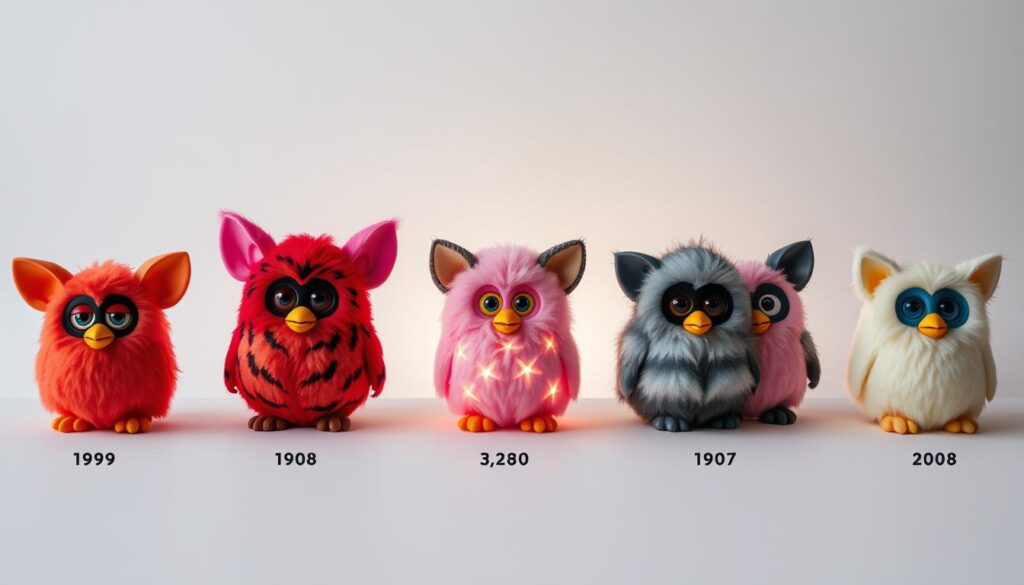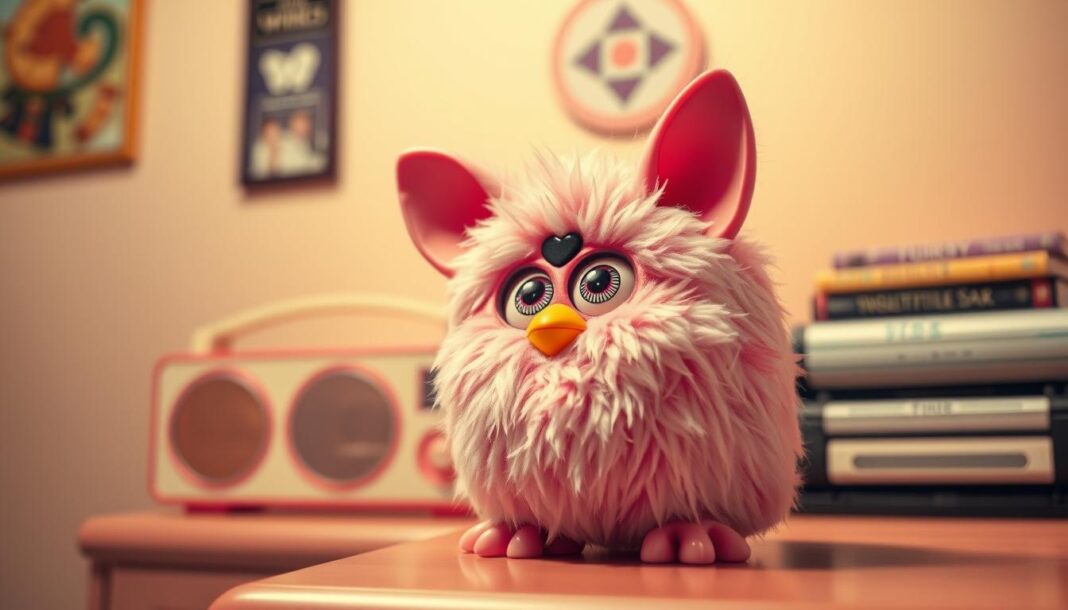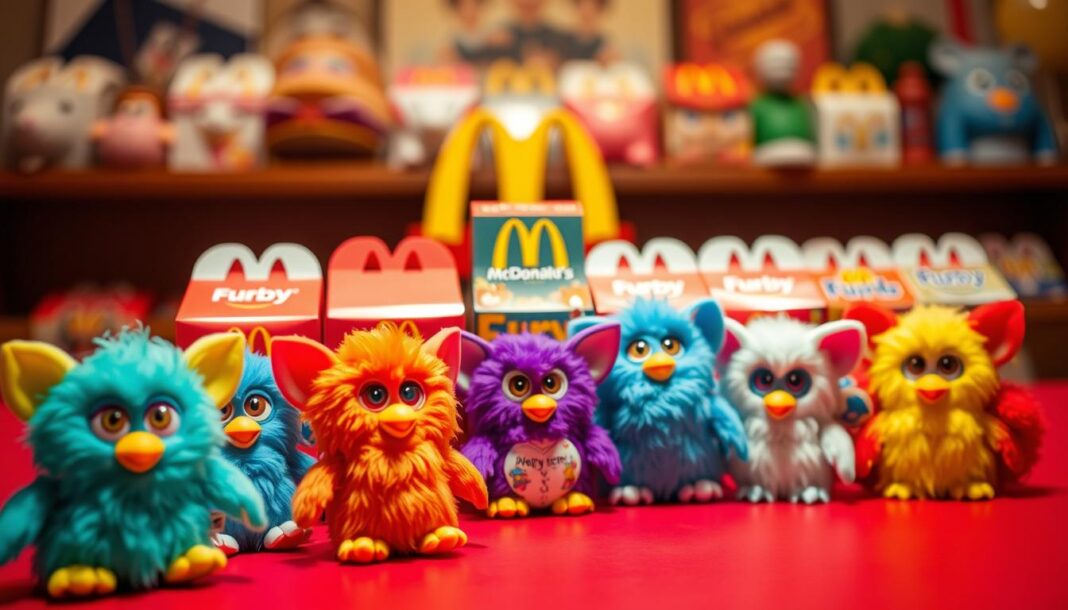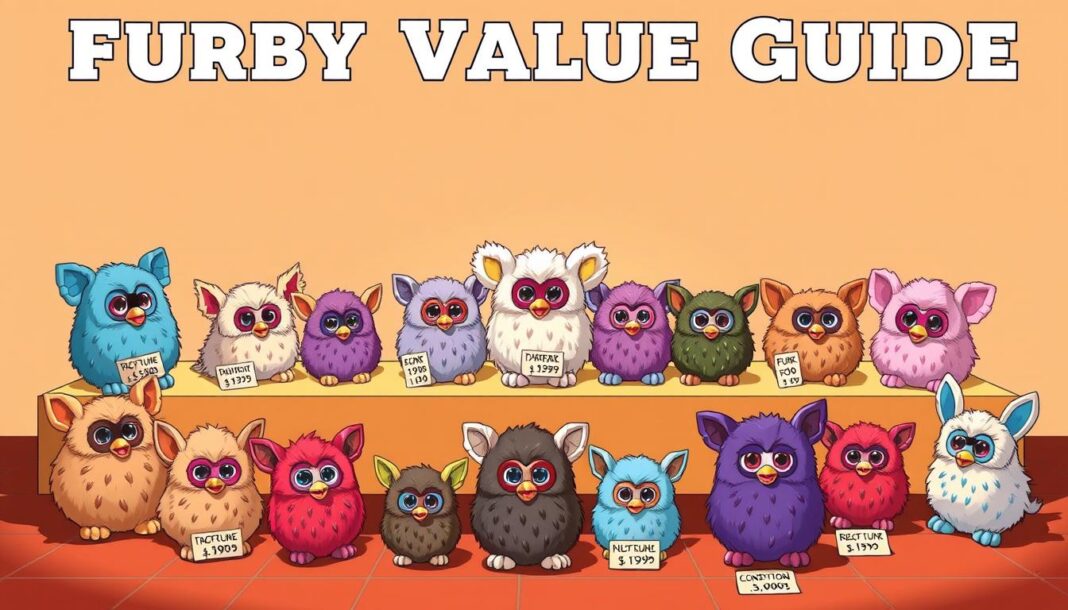In 1998, the world was introduced to a unique creature that quickly became a cultural phenomenon. Furby, the owl-hamster hybrid toy, captured hearts with its quirky design and interactive features. Developed by Tiger Electronics, it sold over 1.8 million units in its debut year alone.
What made Furby stand out was its ability to “learn” Furbish, a fictional language, and gradually transition to English. This feature sparked curiosity and engagement, making it a must-have toy for kids and collectors alike. Its global appeal was further enhanced by translations into 14 languages.
Over the years, Furby evolved with new models, keeping its charm alive. Its 2023 relaunch proves its enduring relevance. To learn more about its journey, check out this detailed exploration of Furby’s history.
When Was Furby First Released? The Birth of an Iconic Toy
The late 90s saw the arrival of a groundbreaking toy that redefined playtime. Its launch in 1998 during the holiday season created a frenzy, with parents scrambling to get their hands on one. Priced at $35, it quickly became the most sought-after gift of the year.
Demand skyrocketed, leading to supply shortages. Scalpers took advantage, reselling the toy for over $300. Fraud incidents also surged, with counterfeit versions flooding the market. Despite these challenges, the release was a massive success, selling 1.8 million units in its first year.
The 1998 Launch: A Holiday Season Phenomenon
The holiday rush of 1998 turned Furby into a cultural icon. Its interactive features and unique design made it a must-have for kids and collectors alike. By 1999, sales soared to 14 million units, solidifying its place in toy history.
Initial Sales and Global Impact
Furby’s success wasn’t limited to the United States. It expanded globally, with translations into 14 languages. In 2000, a partnership with McDonald’s in the UK introduced the Shelby toy, further boosting its popularity.
What made Furby stand out was its ability to tap into consumer psychology. Its “must-have” status was driven by scarcity and innovation. For those looking to relive the magic, check out our collection of authentic Furbys for sale.
The Creators Behind Furby: Dave Hampton and Caleb Chung
The journey of Furby began with two innovative minds, Dave Hampton and Caleb Chung. Their combined expertise and creativity led to the birth of one of the most iconic toys of the 90s. Their vision was to create a relational artifact that could connect emotionally with users, and Furby was the result.
Inspiration and Development Process
Dave Hampton’s Navy experiences played a significant role in shaping Furby’s personality. He drew inspiration from his time in the military to develop Furbish, the toy’s unique language. Caleb Chung, a skilled inventor, focused on the technical aspects, using the 6502 microprocessor as the foundation.
The development process spanned 18 months, with nine months dedicated to design and another nine to production. Prototype challenges were frequent, but the duo persevered, iterating until they achieved the perfect balance of features and charm.
Collaboration with Tiger Electronics
To bring their vision to life, Hampton and Chung partnered with Tiger Electronics. Richard Levy, a key figure in the deal, ensured the toy’s successful licensing and production. Tiger Electronics’ manufacturing scale allowed Furby to reach millions of homes worldwide.
The collaboration resulted in a toy that wasn’t just a gadget but a companion. For more insights into the creators’ journey, explore our detailed guide on understanding Furby.
| Phase | Duration | Key Activities |
|---|---|---|
| Design | 9 months | Prototyping, Furbish language development |
| Production | 9 months | Manufacturing, quality testing |
Furby’s Evolution: From Classic to Modern Models
Over the decades, Furby has transformed from a simple toy to a tech-savvy companion. Each generation introduced new features, keeping it relevant in a rapidly changing world. Let’s explore how this iconic toy has evolved over the years.

First Generation (1998-2002): The Original Furby
The first version of Furby set the standard for interactive toys. Its monochrome eyes and mechanical movements were groundbreaking at the time. This line introduced Furbish, a unique language that gradually transitioned to English, creating a sense of connection with users.
Parents and kids alike were captivated by its quirky design and personality. By 2002, it had become a household name, paving the way for future generations.
Emoto-Tronic Furby (2005-2007): A Technological Leap
The Emoto-Tronic version marked a significant upgrade. Its expressive eyes and advanced sensors allowed for more realistic interactions. This generation could recognize voices and respond with nuanced facial expressions, making it feel almost lifelike.
These features made it a favorite among tech enthusiasts and collectors. It was a clear step forward in the evolution of interactive toys.
Furby Connect and Beyond (2012-Present)
Modern Furbys, like the Furby Connect, have embraced digital innovation. Full-color LCD eyes and Bluetooth connectivity brought a new level of interactivity. However, the Connect model faced criticism for its Bluetooth vulnerability in 2017, highlighting the challenges of integrating advanced sensors.
The 2023 model takes a nostalgic approach, focusing on simplicity with over 600 responses and five voice modes. For a deeper dive into Furby’s generation history, check out this detailed guide.
Why Furby Became a Cultural Phenomenon
Few toys have captured the imagination of millions like Furby did. Its unique blend of interactive features and quirky charm made it a household name. From its fictional language to its expressive personality, Furby offered an experience unlike any other toy.
Furbish Language and Interactive Features
One of Furby’s standout features was its ability to “speak” Furbish. This fictional language, designed by Dave Hampton, created a sense of mystery and engagement. Over time, Furby would “learn” English, giving users the illusion of teaching their new friend.
The toy’s interactive mechanics were groundbreaking. Its sensors allowed it to respond to touch, light, and sound. This made every interaction feel personal and unique. Furby’s personality shone through its movements and sounds, making it feel almost alive.
Furby’s Role in Pop Culture and Media
Furby’s influence extended far beyond the toy aisle. It appeared in popular TV shows like The Simpsons and movies like Uncut Gems and The Mitchells vs. the Machines. These appearances cemented its place in pop culture history.
Celebrities also embraced Furby, sharing stories of their own experiences with the toy. Its meme potential skyrocketed, with viral videos showcasing its quirky behavior. Even the NSA’s ban on Furby in secure facilities added to its mystique, paradoxically boosting its popularity.
Collector communities and conventions continue to celebrate Furby’s legacy. Despite a stalled Hollywood adaptation, its cultural impact remains undeniable. With over 58 million units sold before its 2023 relaunch, Furby’s story is far from over.
Furby’s Unlikely Controversy: The National Security Scare
Few toys have sparked as much intrigue and debate as Furby did during its early years. While it was designed to be a playful companion, it unexpectedly became the center of a national security scare in the United States. This controversy added a layer of mystique to its already fascinating story.
The NSA Ban and Its Aftermath
In January 1999, the National Security Agency (NSA) issued a memo banning Furby from its facilities. The agency feared the toy’s ability to record and repeat conversations could pose a security risk. This decision made headlines, turning Furby into an unlikely symbol of surveillance concerns.
However, these fears were unfounded. Furby’s 6502 processor lacked the ability to record audio. Its responses were pre-programmed, and it couldn’t store or transmit data. Despite this, the ban fueled public speculation and media frenzy.
Debunking the Myths About Furby’s Capabilities
Dave Hampton, one of Furby’s creators, publicly addressed the spy claims. He demonstrated that the toy’s functions were purely mechanical and posed no threat. This debunking highlighted the way technology fears can escalate, even when based on misconceptions.
The controversy drew parallels to post-9/11 surveillance debates. It also foreshadowed modern concerns about smart devices and data privacy. Ironically, Furby’s 2017 Bluetooth vulnerabilities brought these issues full circle.
For a deeper look into Furby’s unexpected role in pop culture, explore our guide on the Furby creepy phenomenon.
Furby’s Enduring Legacy: A Toy That Captured Hearts
For over two decades, Furby has remained a beloved figure in the world of toys. Its history spans four major relaunches, each bringing fresh innovations to this iconic toy. From its humble beginnings to the 2023 Furblets expansion, Furby continues to captivate new generations.
With over 40 million units sold, Furby’s impact is undeniable. Its permanent place in MoMA’s design collection cements its status as a cultural treasure. Collectors today cherish retro models, with some fetching high prices in the vintage market.
Beyond play, Furby has found a role in education, sparking discussions on robotics and AI. Its ability to bond with users has inspired academic studies on human-toy interaction. Looking ahead, Hasbro plans to integrate AR features, ensuring Furby remains relevant in the digital age.
To explore the origins of this iconic toy, check out our detailed guide on the Furby Original 1999. Its story is far from over, and its legacy continues to grow.


